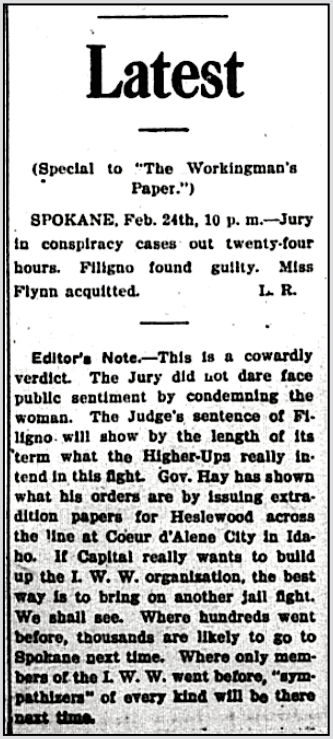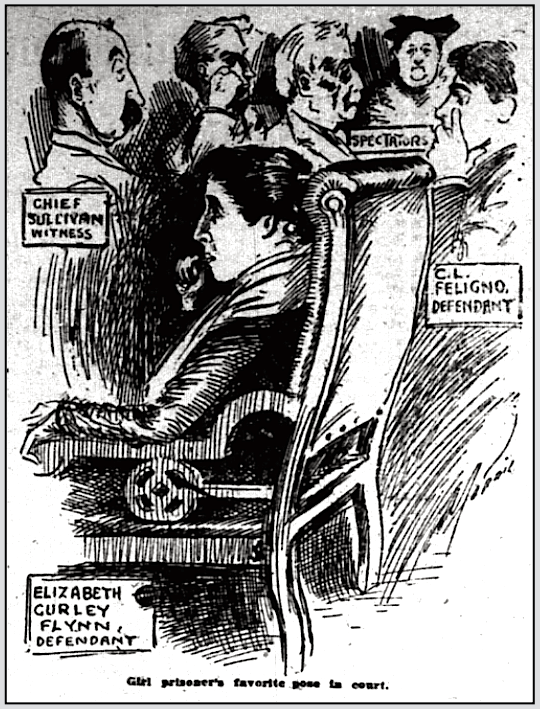 ———-
———-
Hellraisers Journal – Monday February 28, 1910
Spokane, Washington – Trial of Gurley Flynn and Filigno, Part II
From The Workingman’s Paper of February 26, 1910:
[Part II of II.]
The Jury
The first two days of the trial were taken up with impaneling the jury. It fell to Mr. Don Kiser’s lot to have charge of the prosecution’s side of this part of the performance.
About forty men were called before it was possible to get twelve men who were satisfactory. The vast majority were prejudiced against the I. W. W.; in fact, it was a surprise when a man would make the statement that he had formed no opinion concerning the case, or even when one would say he considered labor had a right to organize in order to better its conditions, etc.
Finally, however, by Friday afternoon the jury began to look like a jury and things were ready for taking up the testimony.
[The Prosecution’s Case.]
[Main witness for the prosecution were:
-Detective Martin J. Burns who testified that 20% of those arrested said no more than “Fellow Worker.”
-Chief Sullivan, witness for the prosecution, was unable to explain why foreigners who said no more than “Fellow-Workers” could draw such big crowds.
-“Floor-Spitter” Detective McDonald testified that the men he arrested were all foreigners whose names he could not remember nor pronounce.]
Defense Opens
At 3:30 [Tuesday February 15th] Mr. Symmes addressed the jury, and on request of defense court adjourned at about 4, to take up defense testimony in the morning.
The principal witness for the defense at the Wednesday [February 16th] morning session was John D. [James P.] Thompson, who was examined concerning the conditions prevailing in the jail, especially in the sweat-box. His testimony was to be used to connect up with Filigno’s to prove that Filigno was in the “sweat-box” for forty-five minutes and that at the end of that time was not in a condition, mental or physical, to give a clear account on examination in Sullivan’s office.
Naturally, most of such testimony was objected to by the prosecution, and objection sustained.
During the afternoon session several minor witnesses were on, among them Bailey and Foster. These witnesses could have given much interesting information, but it was of such a character that Pugh and Sullivan didn’t care to hear it, so it was suppressed before it was uttered.
Filigno Testifies
Then came Filigno, whose testimony was weak in comparison to the testimony given later by Hartwell Shippy and Gurley Flynn.
He brought out that he was acting merely as secretary for the committee and received instructions from them, and that he was simply their agent.
He gave a description of the “sweat-box,” holding the twenty-six men, and of the fainting away of Clark.
Shippy, Star Witness
Hartwell S. Shippy was the next witness called, and in many respects was the finest witness during the whole trial by reason of his intellectual clearness and his fearlessness, termed “conceit” by the capitalist press.
When called upon to explain what he meant by such terms as “lackeys of the capitalist class,” to give reasons why he treated the courts and the lawmakers of the land so contemptuously in his articles, he gave a very clear explanation of the place government has always held in the world’s progress. How the laws have always been made by an oppressing class for their own interests in order that their supremacy should be maintained, and that the courts-as an institution-are presided over by men who are simply hirelings of the class in power, and that whether they believe their position to be just or not, these “hirelings” were in duty bound to act in the interest of those upon whom they were dependent for their living.
When asked to explain what he meant by his statements concerning the forces of economic revolution, etc., he very plainly stated that just as there had been a definite economic reason for the overthrow of feudalism and the bringing forth of capitalism (going into detail), so are the economic forces going on today bringing on the death of the capitalist system and the birth of a new social order.
Mr. Pugh, on cross-examination, sarcastically asked him if he considered himself a constitutional lawyer. He said no, he did not. He then asked him concerning his opinion of the courts and laws of this free country. Shippy told him he was not alone in his opinion; it was shared by such men as Lincoln Steffens, Charles Edward Russell and Judge Lindsay [Benjamin B Lindsey].
When asked as to his education on redirect examination, he stated he had had two years of law in one of the Chicago law schools. (The facial expression of prosecution counsel was quite worth noting at this juncture).
The testimony of Shippy lasted until well into Thursday morning [February 17th], and all through it was an exposition of the fearlessness and mental ability of the thinking working class.
“Red Flag” Evidence Excluded
After this witness, defense brought on a witness for the purpose of securing testimony as to the incendiary character of the song, “The Red Flag.” All testimony was prevented by the prosecution.
Shortly before noon Attorney Moore started the reading of various articles in the several issues of “The Worker” that Pugh had entered as exhibits. (For some reason he entered the entire paper instead of simply the articles written by Gurley Flynn, so it gave the defense an opportunity to read any and all articles bearing on the street fight. By noon time Mr. Moore’s voice gave out, owing to a cold and at the afternoon session the writer of this was called upon to finish the readings, which continued well into the afternoon. It was hard to tell whether the prosecution listened to this with pleasure of not, but it is certain that the jury was very much interested in hearing accounts that they had been kept from hearing during testimony.
Gurley Flynn In Witness Chair
At 3 p. m. Elizabeth Gurley Flynn was called to the stand, and her testimony lasted until well on to noon on Friday [February 18th]. During her examination there were more women in the courtroom than at any other time. (It was a disgrace to Spokane that when a woman was being tried there should have been so few women in the town interested in the outcome. That courtroom should have been full of women. It is always amusing to hear the suffragists hark about the treatment women will get in the courts when women have the suffrage. But just let a Revolutionary woman be tried for anything, or be running for any office, and see how many suffragists rally to her support!)
Like the testimony of Hartwell Shippy, Gurley Flynn’s answers were to the point always. Never did she evade the truth, and her directness must have had weight with the jury. Even Attorney Pugh was compelled to say that he admired her spirit. When he asked if the fact that she was on trial did not make some difference in her position, and she answered, “Not in the least.”
When questioning, her counsel would invariably say: “Miss Flynn, tell the jury,” etc., which she would proceed to do, looking the jury frankly and fearlessly in the face. No matter whether one agrees with the beliefs of another or not, fearlessness is something that every one admired, and certainly that played a large part in Gurley Flynn’s testimony.
After she left the stand Martin J. Burns was called in rebuttal. On cross-examination he admitted that there was a cell in the city jail called “the tank,” and described what outsiders call the “sweat-box” in detail. The cross-examination on this was very interesting, to put it mildly, although Mr. Burns said he had not been to the “the tank” on either the 2nd or 3rd of November, the days when there were so many of the I. W. W. confined there. It was a noticeable fact that the prosecution did not recall Chief Sullivan, who was the one who shut the door on the prisoners every time during those two days.
This practically ended the testimony and early on Friday afternoon the defense rested.
* * *
Whether this case is won or lost, it marks one more step of the first stage of the gigantic struggle between the class in power and the Revolutionary wing of the Working Class-a struggle which nothing short of the emancipation of the Working class can end.
Shippy “Gets His”
At 6 o’clock on Friday night word was brought from the county jail that Hartwell Shippy had been put on bread and water; that he had been attached to the 20-pound ball and chain, and that there was talk of solitary confinement as a result of his fearless testimony! So are those who are faithful to their class rewarded by their masters.
B.F.
———-
[Emphasis added.]
~~~~~~~~~~~~~~~~~~~~~~
SOURCES & IMAGES
Quote EGF, Compliment IWW, IW p1, Nov 17, 1909
https://www.marxists.org/history/usa/pubs/industrialworker/iw/v1n35-nov-17-1909-IW.pdf
The Workingman’s Paper
(Seattle, Washington)
-Feb 26, 1910
https://www.marxists.org/history/usa/pubs/thesocialist-seattle/100226-seattlesocialist-v10w461.pdf
Note: the only Clark that I have found on lists of those arrested in Spokane Free Speech Fight during early Nov 1909 is a George Clark, more research needed.
See also:
Hellraisers Journal – Sunday February 27, 1910
Spokane, Washington – Trial of Gurley Flynn and Filigno, Part I
Tag: Spokane Free Speech Fight of 1909-1910
https://weneverforget.org/tag/spokane-free-speech-fight-of-1909-1910/
Tag: Elizabeth Gurley Flynn
https://weneverforget.org/tag/elizabeth-gurley-flynn/
Tag: C. L. Filigno
https://weneverforget.org/tag/c-l-filigno/
Tag: Bessy Fiset
https://weneverforget.org/tag/bessy-fiset/
~~~~~~~~~~~~~~~~~~~~~~~~~~~~~~~~~~~~~~~~~~~~~~~~~~~
We Will Sing One Song – Six Feet In the Pine
Lyrics by Joe Hill



